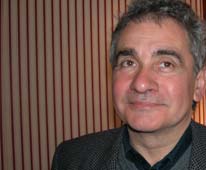
Bernardo Atxaga
- Spain
- Zu Gast beim ilb: 2001
Bernardo Atxaga was born in 1951 in Asteasu, the Basque province of Guipúzcoa, as Joseba Irazu Garmendia. He is one of the few Basque writers to attain international recognition. His prize-winning book of essays “Obabakoak” (1988) aided the young author’s breakthrough and has been translated into 20 languages. Before Garmendia opted for literature, he studied Political Economy, then Philosophy at the University of Barcelona. He produced his first literary essays in the early 1970s, helped by the Basque poet Gabriel Aresti, who campaigned for a revival of their mother tongue. Only about one million people in Spain and the Basque regions of France along the Pyrenees understand “Euskara Batua”, the Basque language. Besides having difficulty reaching a wider reader-ship, Basque authors of the ’40s and ’50s had to fight repression by the Franco regime. Some of their literary work vanished in the orgies of book-burning. While the situation eased in the 1970s, the author still chose to publish under the nom de plume Bernardo Atxaga.
Although the decision to embrace his mother tongue Basque has no political motive, the anti-Franco resistance is a recurrent theme in his books. Recently he published “Soinujolearen semea” (2004; t: The son of the accordian player), a novel about an encounter between two former Basque underground fighters, many years after they first met. This second meeting reveals their growing involvement in the terrorist organisation, their treachery and their mutual alienation – against the backdrop of the country’s history.
His repertoire includes lyrics, novels and short stories as well as chansons and song lyrics for avantgarde Basque rock bands. Some of his lyrics have also been set to opera music. “Literature must rule. Literature must elicit more than just an ‘ouch’. It must give form to the present day.” says Atxaga. Or, to quote the cow “Mo” in his 1995 animal tale: “‘What did you think life is about – believing everything and lying back in supplication?’. Of course not – that would just be silly, would it not?”
Among several Basque prizes for literature and critique, he was awarded the Premio Nacional de Narrativa (Spain 1989), the Millepages Prix (France 1992) and the Prix des trois Couronnes (France 1995).
© international literature festival berlin
Memoiren einer baskischen Kuh
Altberliner Verlag
Berlin, München, 1995
Übersetzung: Ludger Mees
Obabakoak oder das Gänsespiel
Unionsverlag
Zürich, 1995
Übersetzung: Gió Waeckerlin Induni
Shola und die Löwen
Altberliner Verlag
Berlin, München, 1997
Übersetzung: Katrin Schulz
Ein Mann allein
Unionsverlag
Zürich, 1997
Übersetzung: Gió Waeckerlin Induni
Shola und die Wildschweine
Altberliner Verlag
Berlin, München, 1998
Übersetzung: Katrin Schulz
Bambulos wahre Lügengeschichten
Altberliner Verlag
Berlin, München, 2000
Übersetzung: Sabine Müller-Nordhoff
Fenster zum Himmel
Suhrkamp
Frankfurt/Main, 1999
Übersetzung: Willi Zurbrüggen
Bambulo auf den Hund gekommen
Altberliner Verlag
Berlin, München, 2000
Übersetzung: Sabine Müller-Nordhoff
Der Sohn des Akkordeonspielers
Insel
Frankfurt/Main, 2006
Übersetzung: Matthias Strobel
Übersetzer: Margaret Jull Costa, Giò Waeckerlin Induni, Ludger Mees, Sabine Müller-Nordhoff, Katrin Schulz, Willi Zurbrüggen
